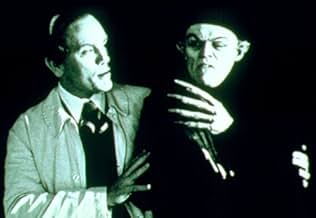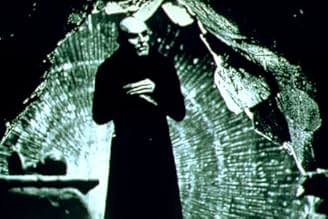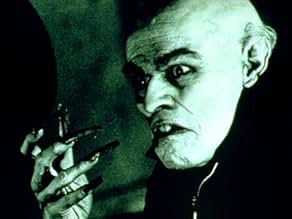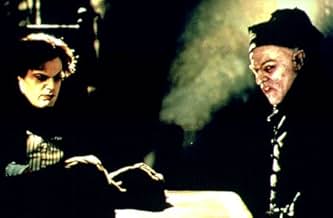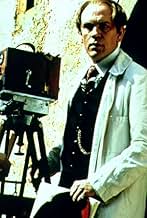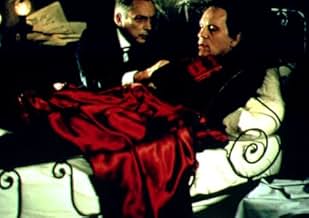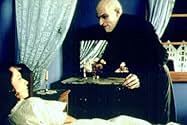The filming of Nosferatu le vampire (1922) is hampered by the fact that its star Max Schreck is taking the role of a vampire far more seriously than seems humanly possible.The filming of Nosferatu le vampire (1922) is hampered by the fact that its star Max Schreck is taking the role of a vampire far more seriously than seems humanly possible.The filming of Nosferatu le vampire (1922) is hampered by the fact that its star Max Schreck is taking the role of a vampire far more seriously than seems humanly possible.
- Nominated for 2 Oscars
- 16 wins & 30 nominations total
- Henrik Galeen
- (as John Aden Gillet)
- Paul - Camera Assistant
- (as Nicholas Elliot)
- Innkeeper
- (as Milos Hlavak)
- Drunken Woman
- (as Sacha Ley)
- Old Woman
- (as Marie Paule Van Roesgen)
- Director
- Writer
- All cast & crew
- Production, box office & more at IMDbPro
Featured reviews
The movie asks us to imagine: What if Max Schreck, the mysterious guy who gave what is still considered one of the best vampire performances ever, did so well because, well, he really was a vampire? The skulking creature, we are to imagine, was finagled into performing in "Nosferatu" for legendary cinema pioneer F.W. Murnau. The story then follows as the crew makes the movie dealing with all sorts of difficulties, not the least of which is the star's habit of snacking on cameramen.
Among the film's many virtues is its portrayal of filmmaking in what was really its dawn as a form of art and commerce. People like me, who have trouble with silent movies may gain an additional appreciation for the work and craft that went in to them, and realize that while they may seem hokey and stylized to us now, they had a beauty and substance that was all their own, and still is.
John Malkovich turns in a great performance as the visionary Murnau (who, while tortured, must be a genius because he always gets it in one take). It is a characteristic Malkovich role, a rationalist given to bouts of fury, and it is as much fun to see him discourse pretentiously on the science and art of the moving image as it is to see him pitch a fit ("Albon, a NATIVE has wandered into my FRAME!").
The core of this movie, however, and deservedly so, is Willem Dafoe's unforgettable portrayal of Schreck. This is not your slick-talking Anne-Rice undead-Vogue kinda vampire. Schreck is the next thing up from a rat, squatting in filth and clicking his claws, and Dafoe is able to inspire laughter as well as fear, and even pathos. He makes us imagine what a rotten existence it must be, to have eternal life alone in a rotting ruin and a withered body. He and Malkovich have some great scenes together, including a sick, hilarious moment when Schreck and Murnau try to hammer out who on the crew may or may not be snacked upon (the cinematographer is necessary, it seems, but the script girl is negotiable).
The movie functions best as a sendup of moviemaking, as the harried Murnau must deal with temperamental actors, unfriendly locals, blood-sucking undead, and other hazards of the movie trade. At one point, Murnau must leave to calm the investors, a scene I really wish had been included. Some of the best moments are those of the age-old creature of the night attempting to take direction and find his "motivation." Everyone is afraid of Schreck, but admire the dedication that keeps him in character all the time (he's a Method actor, explains Murnau, he studied with Stanislavsky). The movie makes its point rather neatly, that filmmakers, and by extension filmmaking itself, have a way of sucking the life and blood out of you. Anyone who has ever had to shoot a movie on location will attest to this.
If I have a complaint about the movie, it is only that after its extreme cleverness, it settles for a somewhat straightforward horror-style denouement. Myself, I would have thought the vampire would end up moving to Berlin and getting an agent, a swimming pool, and a meeting with Ovitz. Still, the movie clearly makes its point: an auteur driven by a mania for artistic perfection can be more of a monster than something that just lives in a cave and drinks blood from your neck.
'Shadow of the Vampire' Synopsis: The filming of Nosferatu is hampered by the fact that the star is taking his role far more seriously than what seems humanly possible.
'Shadow of the Vampire' is a fictionalized account, so you shouldn't take this one too seriously. This Horror film, is creepy, atmospheric & yet funny. The Entire Story, The Entire Execution, in fact, is very convincing, even though, it won't work for the faint-hearted.
Steven Katz's Screenplay is superb. It's scary, creepy, atmospheric, funny & VERY innovative. E. Elias Merhige's Direction is as Eerie as it gets! Cinematography by Lou Bogue is fabulous. Editing by Royinba Onijala is crisp. Music by Dan Jones is good. Make-Up is Marvelous.
Performance-Wise: Willem Dafoe is Truly Magnificent, in an Oscar-Nominated Performance! His performance as Max Schreck, who plays Count Orlok/Count Dracula, is an astonishing embodiment, that's an Actor-Study. This is a Performance that deserves to be seen by each & every actor! John Malkovich as Frederich Wilhelm Murnau, is competent. Udo Kier as Albin Grau, is first-rate. Udo Kier as Albin Grau, is impressive. Catherine McCormack as Greta Schroeder, is worth a mention.
On the whole, 'Shadow of the Vampire' is an interesting film, but Willem Dafoe's Performance is its greatest merit.
The concept here is incredibly intriguing - what if a horror movie was a horror to film? Once the film kicks into gear, it establishes a rather creepy mood, especially in the sets, most of which mirror those of "Nosferatu" (the writer's bed, for instance, looks exactly like Hutter's).
As the film progresses, the actors take over the film, and it's interesting to see how they stack up to their precursors from 70 years ago. Eddie Izzard is an interesting Hutter (the Jonathan Harker analog), as (pretend) silent acting is well-tailored to his overbearing antics. Udo Kier is quite good as reserved producer Albin Grau. Alas, Cary Elwes, one of Hollywood's most underappreciated actors, is typecast as a kind of roguish, free-spirited Fritz Wagner, a real cinematographer (and the main one throughout all of "Nosferatu") and one of the stalwarts of German cinema into the 50's.
Malkovich is ideal for this role. He does a good job of being a manic, desparate for everything on his film to go right. His Murnau is a control-freak, a guy who keeps his crew in the dark, and adds to the generally creepiness.
The most curious thing about Murnau's "Nosferatu" is the vampire himself. The rest of the characters are pretty direct analogs of "Dracula". But instead of a suave, cool vampire of the Christopher Lee/Gary Oldman mold (later roles, of course), Murnau's vampire was a stiff, cold, violent monster. Willem Dafoe is absolutely brilliant in portraying this. He has some moments of comedic relief, bickering harmlessly with Malkovich, and generally being a fish out of water. Soon, however, his character becomes undeniably creepy, and Dafoe does a great job of making Count Orlok seem like the kind of guy who makes your skin crawl. In some way, this Orlok is less of a monster - he's portrayed a bit more sympathetically, sorrowing in his loneliness and never getting to see light. Murnau's vampire was almost always shot from below, making him appear huge and menacing; Dafoe's Orlok isn't monstrous so much as he just makes your skin crawl.
I do have a couple beefs, though, mainly technical. On a purely nitpicky level, Murnau is mentioned as a comtemporary of Griffith and Eisenstein, despite the fact that Eisenstein didn't make a movie until two years after "Nosferatu". On a less petty level, the characters seem a bit dumb. They have no problem accepting the fact that Orlok is an actual vampire once Malkovich tells them, but can't seem to figure it out on their own, despite seeing, among other things, Orlok pulling a bat out of the air and sucking the blood out of it.
The film, in general, does not end well. The penultimate scene is horribly contrived, a lot of silly reminiscing to to advance the plot a little. The ending itself isn't necessarily bad, just a bit ambigous. You don't come away with a clear sense of who (if anyone) was wronged amongst the main characters, and we leave a couple of them in limbo. A couple of technical details are odd, too. Murnau's Nosferatu has a shadow and a reflection, but this one only a shadow. Also, in the final scene they are supposedly filming, there's a wooden stake that's nowhere to be found in "Nosferatu".
A quick note, by the way - while the movie they are filming actually exists, rest assured the story is pure fantasy. Max Schreck went on to make more movies, as did the rest of the actors in this film, and no actors were bitten during the filming of the original movie.
A thououghly enjoyable film, especially if you're familiar with the subject matter.
I've never really been a big fan of Nosferatu nor a particular admirer of Willem Dafoe, but this bizarre little movie has made me appreciate both much more. A fictionalised account of the making of F.W. Murnau's 1922 silent horror classic, Shadow of the Vampire toys with the notion that Nosferatu's star Max Schreck (played here by Dafoe) was actually a bona fide member of the undead.
This fanciful idea plays out a little too slowly, perhaps, but offers plenty of opportunity for dark humour, the cast delivering suitably offbeat performances that prove strangely intoxicating, with Dafoe's mesmerising turn as Shreck being the film's strongest suit, the actor's mannerisms and expressions played to perfection.
Casual movie fans who haven't seen Murnau's classic will probably wonder what the hell is going on, so I recommend seeing Nosferatu beforehand, just so that one can fully appreciate the magic of certain scenes and the brilliance of Dafoe's performance.
This is an inventive film that looks at how far art will go to create. The director Murnau seems as driven by the creative process as Shreck is by his lust for blood. This comparison is carried through the whole film until the inevitable showdown between the two drives. The setup itself is fascinating but the comparison between the two men makes it even better.
The film is well shot and uses the different cameras well. It looks really good and mixes bright shots with shadowy darkness really well. It also benefits from a good cast. Malkovich is excellent as the driven director who easily becomes a monster himself but Dafoe is even better. Despite being almost unrecognisable under the make up, Dafoe manages to bring humanity to his monster he also brings some humour without making his a comedy role. Elwes is underused, but Izzard is great as a bad 1920's actor!
Overall this may not inspire interest in everyone but it has a great cast and a good central story. The comparisons drawn between Murnau and Shreck only improve what is already a very enjoyable film.
Did you know
- TriviaBased in part upon a legend that Max Schreck was in reality a vampire which is why he played the role of Orlok/Dracula so well. Some variations of the legend suggest that Nosferatu le vampire (1922) was the only film Schreck made, though in reality he was already a stage and screen veteran by the time Nosferatu was shot, and would appear in many non-vampiric roles before his death in 1936.
- GoofsThere is a reflection of Count Orlock's head in the mirror moments after a big deal was made about the fact that he cast no reflection in the same mirror (although this is possibly a deliberate nod to Nosferatu le vampire (1922) in which a similar error was made).
- Quotes
[Asked what he thought of the book, Dracula]
Max Schreck: It made me sad.
Albin: Why sad?
Max Schreck: Because Dracula had no servants.
Albin: I think you missed the point of the book, Count Orlock.
Max Schreck: Dracula hasn't had servants in 400 years and then a man comes to his ancestral home, and he must convince him that he... that he is like the man. He has to feed him, when he himself hasn't eaten food in centuries. Can he even remember how to buy bread? How to select cheese and wine? And then he remembers the rest of it. How to prepare a meal, how to make a bed. He remembers his first glory, his armies, his retainers, and what he is reduced to. The loneliest part of the book comes... when the man accidentally sees Dracula setting his table.
- Crazy creditsCredits end with the sounds of the camera filming and of the phonograph which set the mood for the actors.
- ConnectionsEdited from Nosferatu le vampire (1922)
- How long is Shadow of the Vampire?Powered by Alexa
Details
- Release date
- Countries of origin
- Languages
- Also known as
- La sombra del vampiro
- Filming locations
- Vianden, Luxembourg(Castle interior scenes)
- Production companies
- See more company credits at IMDbPro
Box office
- Budget
- $8,000,000 (estimated)
- Gross US & Canada
- $8,293,784
- Opening weekend US & Canada
- $150,171
- Jan 1, 2001
- Gross worldwide
- $11,155,214
- Runtime1 hour 32 minutes
- Color
- Sound mix
- Aspect ratio
- 2.35 : 1
Contribute to this page





